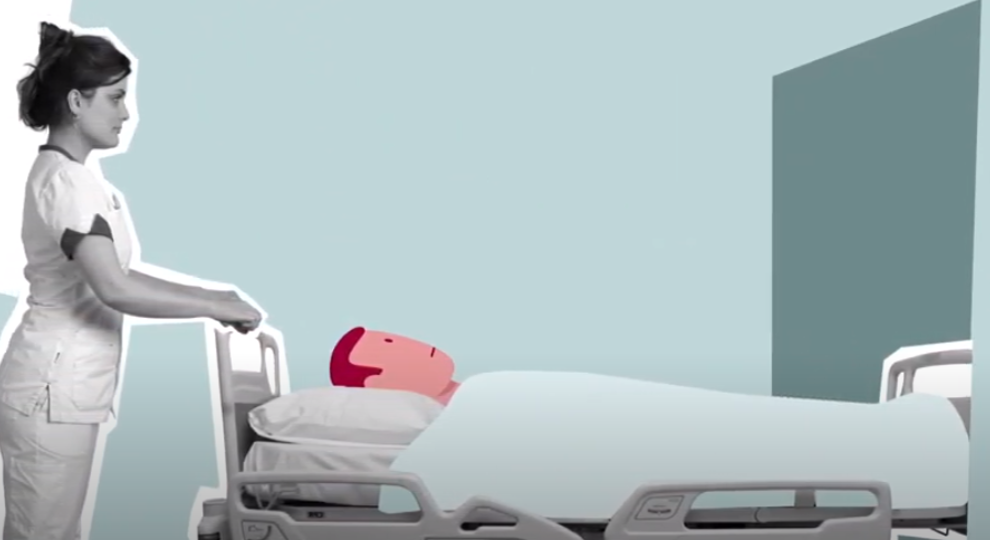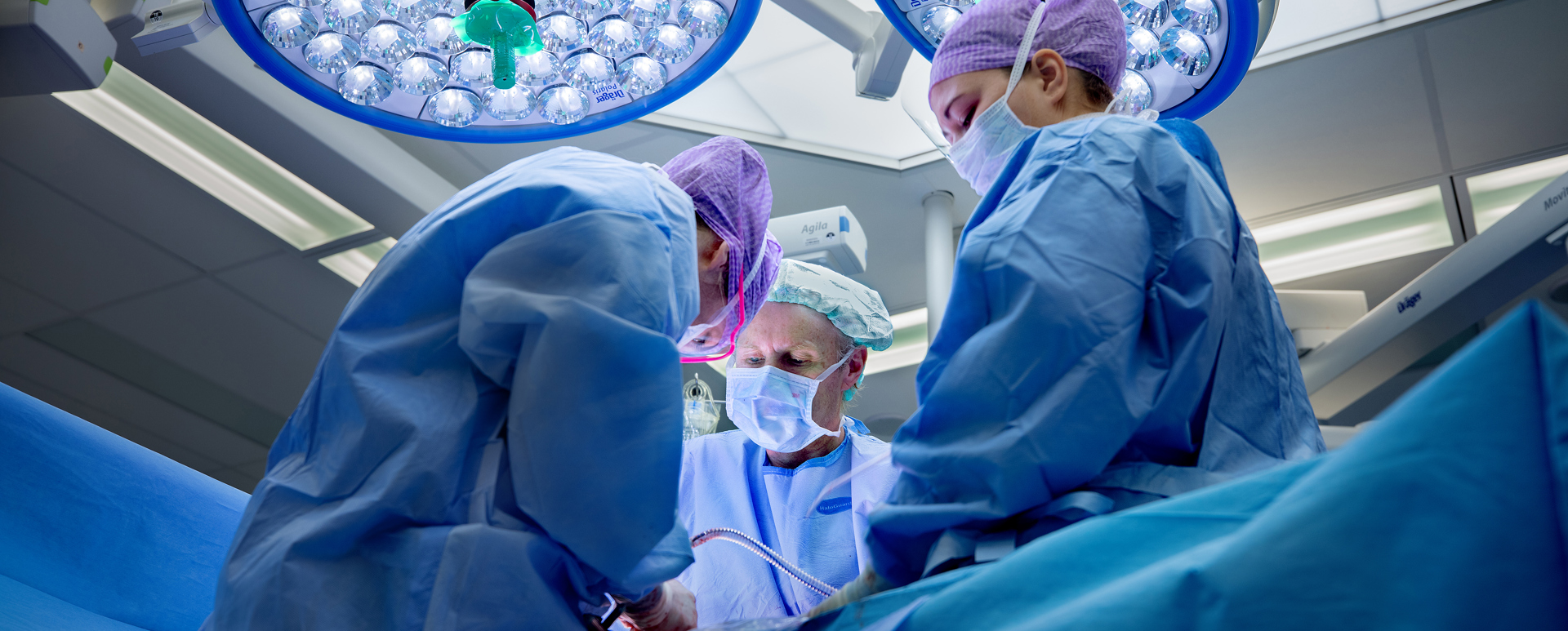Surgery for bladder cancer
There are two main types of bladder cancer: muscle invasive bladder cancer and non-muscle invasive bladder cancer.
Muscle invasive bladder cancer
Muscle invasive bladder cancer means that the tumor has spread into the thick muscle of the bladder wall. People with this type of bladder cancer will need to have their bladder removed. This removal, a cystectomy, can be done through abdominal incision, or robot-assisted keyhole (laparoscopic) surgery.
Non-muscle invasive bladder cancer
Non-muscle invasive bladder cancer means that the tumor has not spread into the thick muscle of the bladder wall. People with this type of bladder cancer can have their tumor removed through transurethral surgery, meaning that the tumor is taken out of the body through the urethra.
Who qualifies for robot-assisted surgery (Da Vinci Robot)?
There are several factors that determine whether you qualify for robot-assisted surgery, such as your medical history, and the stage of your bladder cancer.
More information
Surgery for bladder cancer - what to expect?
You will receive general or local anesthesia (epidural) before your surgery. If the goal of the procedure is to remove the tumor, your surgeon will insert a special instrument into the urethra. Through image guided techniques, your surgeon can remove the tumor, layer by layer. Your surgeon will leave a small tube in your bladder (urine catheter) in order to rinse out any potential blood clots in your bladder after the surgery.
Muscle invasive bladder cancer
If you have muscle invasive bladder cancer, your bladder will be removed, together with all lymph nodes in the area. After surgery, there are several options for urine collection, ranging from an ostomy bag (collection outside of the body), to a reconstruction of the urinary tract using approximately 50 cm of the small intestine. An ostomy nurse can tell you more about your options before your surgery.
Efficacy
Bladder cancer surgery is a curative treatment which aims to fully remove the tumor. If the tumor is too big, or if it has spread to the lymph nodes, you will be treated with chemotherapy before your surgery. We will use imaging scans to see whether you respond well to the chemotherapy – if so, the surgery will be the final part of your treatment.
Your surgeon may discover undetected metastases during surgery. If this is the case for you, you will need additional treatment after the procedure. This can be chemotherapy, radiation therapy, or a combination of the two.
Preoperative screening
Before your surgery, you will be invited to meet with your anesthesiologist at the outpatient clinic for a consultation and a brief examination to assess your overall shape and any potential particularities we will need to keep in mind. The consultation assistant will measure your heart rate and blood pressure and will inquire about your height and weight. If needed, we can take those measurements during the appointment.
This preoperative screening will take approximately 20 minutes and will form the base of your anesthesia. Your anesthesiologist will listen to your lungs and heart and inspect your mouth and throat in preparation of the breathing tube that will be placed during surgery. Your anesthesiologist will also ask you:
Before your surgery, you will be invited to meet with your anesthesiologist at the outpatient clinic for a consultation and a brief examination to assess your overall shape and any potential particularities we will need to keep in mind. The consultation assistant will measure your heart rate and blood pressure and will inquire about your height and weight. If needed, we can take those measurements during the appointment.
This preoperative screening will take approximately 20 minutes and will form the base of your anesthesia. Your anesthesiologist will listen to your lungs and heart and inspect your mouth and throat in preparation of the breathing tube that will be placed during surgery. Your anesthesiologist will also ask you:
- whether you have been under anesthesia before
- whether you have any other conditions
- whether you have taken cancer medicine before
- whether you have had radiation treatment before
- whether you have any allergies
- whether you smoke
- whether you drink alcohol
- what kind of medication you take
Please inform your anesthesiologist of the type of medication and dose you take, and how often you take it. Your physician may want to run more tests before your surgery, such as: electrocardiogram (ECG), lung x-rays, a lung function test, or a blood test.
General and local anesthesia
Before your surgery you will be given general anesthesia, local anesthesia, or a combination of the two. General anesthesia means that you will be completely unconscious during surgery, whereas local anesthesia means that a part of your body will be numb and motionless.
General anesthesia
General anesthesia completely sedates your body. You will be given a cocktail of sleeping medicine, pain killers, and sometimes a muscle relaxant through IV. You will be unconscious within 30 seconds. You will be ventilated during the entire process.
If you are having major surgery, we will place a respiration tube in your throat. For smaller surgeries, a small cap in the back of the throat will suffice. We will closely monitor your heart rate, blood pressure, breathing, and temperature through our monitoring devices.
Local anesthesia
If you are given local anesthesia, you will be conscious during your surgery. Local anesthetics are usually administered through an epidural in the spine, and will temporarily numb all body parts underneath. We may place a tube to give you IV pain medication during and after surgery.
Your anesthesiologist will keep a close eye on your blood pressure, heart rate, breathing, and temperature in order to adapt the anesthesia if needed.
Most people undergoing major surgery will be given a mixture of general and local anesthetics.
Side effects
If your bladder was preserved and only the tumor was removed, you may experience cramps and bleedings in the area after the surgery. You will be at risk of developing a urinary tract infection, and may see blood in your urine or feel a burning sensation when peeing over the weeks following the surgery.
After bladder removal
If your bladder has been removed, you may have to take some time getting used to the different way of collecting urine. Our nurses can offer you more guidance. Many people, both men and women, experience sexual dysfunction after surgery. Men may struggle with erectile dysfunction or retrograde ejaculation (orgasm with little to no fluids). Women may experience vaginal dryness and pain during sex.
After the procedure
After a transurethral procedure, we will rinse the bladder to prevent blood clots from accumulating. Some patients will be treated with a one-time chemotherapy flush to prevent recurrence. Please make sure to drink a lot of fluids during the first days after surgery.
Recovery
Bladder removal surgery can be intense, both mentally and physically. It may take some time before you can continue your day-to-day activities. You may continue to feel fatigued for months after your surgery.
Fertility preservation
Treatment for bladder cancer may negatively affect your fertility, which is why the Netherlands Cancer Institute, in collaboration with the Amsterdam UMC, location AMC and the LUMC, offers fertility prevention.

 nl
nl
 Nederlands
Nederlands
